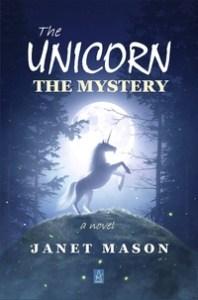
The Unicorn, The Mystery is a novel based on a series of seven tapestries titled "The Hunt of the Unicorn." We follow a (genderless) unicorn through this story, while also getting the point of view of a monk who also makes an appearance in the tapestries. I want to start by saying that this doesn't have a sapphic point of view character, though the most significant side characters are two nuns who are a couple.
I didn't know going into this story how religious/spiritual it would be, and I'm not sure I have the background to really understand it. I shouldn't have been surprised, considering the author is a Unitarian Universalist lay minister who also wrote a book titled THEY, a Biblical Tale of Secret Genders. We spend most of the book inside the heads of the monk and unicorn-not just in the sense that it is from their point of view. This is a very internal novel: we spend a lot of time just following their musings on various subjects, including the unicorn speculating about the motivations of the hunters:
Maybe they wanted to please her. Maybe they wanted to refute her. Why did they really want to hunt me? What were they looking for? Did they really want to kill me - or were they looking for something in themselves and trying to kill it? Or were they just following orders and trying to impress each other? ...
Perhaps the hunters are worried that they might not get their reward. Kings often promise riches that they never intend to give. Everyone knows that they are stingy and that is how they become kings. This would mean that the hounds wouldn't get their treats. Maybe the hounds picked up their owner's apprehensions. Hounds are so servile! ...
Maybe they are glum because they have realized that kings will always be kings and hunters will always be hunters. . . Maybe the hunters look grim because they are thinking about the fact that everybody dies...
Although they have very different life circumstances, both characters' POVs feel similar in that they both think highly of themselves and believe they have wisdom to bestow. Especially when it came to religious opining, I wasn't sure whether I was meant to agree with them or not-although both characters believe themselves to be wise, they are flawed and inconsistent, so it was difficult for me to tell.
Because the story is based around the tapestries, time moves strangely throughout the story. The unicorn is looking at the tapestries, recalling their life, and we sometimes bounce between time periods in a small space. It's almost as if all the action of the novel is happening at once: the unicorn is always being hunted, and it's always free, so I didn't get a sense of tension. I won't mention any specifics, but the ending didn't provide much more information than we already knew.
I also sometimes had difficulty with the asides of this story. A Gnostic poem, "The Thunder, Perfect Mind," is quoted at length through the story, sometimes for pages at a time, and I wasn't sure the purpose of these passages (they are spoken by the unicorn, who finds them spilling from their mouth). The tapestries are also described at length. There is a lot of space devoted to Greek and Latin, including multiple passages describing the shape of each letter in a word in Greek. (I was particularly confused by the inclusion of a poem the monk wrote, which was written in Latin, but is included in English with the same formatting as if it was in Latin? "see/ a yel/low ha/ lo all a/round you/ - among humans/ you are/ a de/light!" I don't understand.)
We do see several scenes of the nun couple, though we unfortunately do not get their point of view. As intrigued as I am by them, I felt like each scene was essentially the same: they would discuss how the church would disapprove of their relationship, and then conclude that their love is not a sin. They go through different iterations of this, but it felt like they served a purpose-to argue against the idea that being gay is sinful-more than they were characters in their own right.
I wanted to include some content warnings as well: the unicorn can smell virginity, and there is quite a bit in here about virginity as well as anti sex work ideas. There are also mentions of bestiality.
Overall, this wasn't a perfect fit for me: it is concerned with grappling with Christian ideas about truth and morality. If that is something you are interested in, The Unicorn, The Mystery will give you a lot to consider.
This has been a sponsored review. For more information, check out the Lesbrary's review policy.
